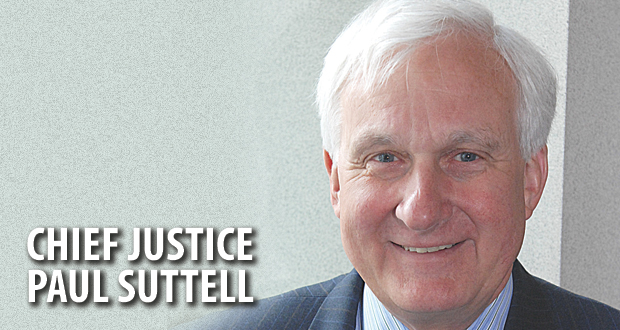 The Rhode Island Supreme Court has upheld a trial judge’s decision that prevents a commercial business from using an abutting diner’s parking area to make deliveries.
The Rhode Island Supreme Court has upheld a trial judge’s decision that prevents a commercial business from using an abutting diner’s parking area to make deliveries.
The plaintiff diner, arguing trespass, sought a preliminary injunction to preclude delivery trucks from passing over its property.
Finding no merit to a claim of a prescriptive easement asserted by the defendant landowner and its co-defendant commercial tenant, the Supreme Court affirmed a Superior Court judgment granting the plaintiff’s request.
“[W]e have held that the true owner can ‘stop the statutory prescriptive period from running’ by ‘affirmatively communicat[ing]’ objection to the use,” Chief Justice Paul A. Suttell wrote for the unanimous court. “Here, as the hearing justice found, defendants’ claim for a prescriptive easement was defeated by the undisputed fact that plaintiff objected to defendants’ use of the property shortly after [the tenant] began operating in its current location.”
Providence, Rhode Island, attorney Merrill J. Friedemann represented the plaintiff. Kelly A. Carden of Warwick, Rhode Island, represented the defendants.
Delivery trucks
Defendant A.R. Bilodeau rented its property on Douglas Avenue in North Providence, Rhode Island, to co-defendant Service Tech, which manufactures and services water remediation and air filtration equipment.
The defendant’s property abuts that of plaintiff Mario Gianfrancesco, owner of the Geneva Diner. The two properties are accessible from Douglas Avenue by means of adjacent driveways, or “curb cuts,” separated by a small section of sidewalk. The curb cuts lead to an open parking area, through which runs the unmarked boundary line between the two lots.
As part of its usual operations, the defendant tenant requires deliveries of materials that arrive on large tractor-trailer trucks. Since Service Tech began operating at its current location in 1998, delivery trucks routinely travel on a diagonal path from Douglas Avenue, through the plaintiff’s driveway, and onto the premises leased from defendant A.R. Bilodeau.
“The diagonal path through plaintiff’s driveway to Service Tech’s premises, which is traveled regularly by the large delivery trucks, is the disputed property at issue in this case,” Suttell said.
The plaintiff testified that, between 1999 and 2001, there were a few instances in which trucks caused damage to the diner while making deliveries to Service Tech.
According to the plaintiff, after that happened multiple times, he “aggressively policed” his property in order to prevent the trucks from causing further damage.
The plaintiff testified that the trucks continued to pass through his property despite his actions, although less frequently.
Superior Court Judge Daniel A. Procaccini issued a bench decision granting the plaintiff’s request for preliminary injunctive relief.
Balance of equities
“The only threat to plaintiff’s claims with regard to ownership and title was defendants’ asserted claim of an easement by prescription, which claim was rejected by the hearing justice,” Suttell said.
An easement by prescription can be established only through “actual, open, notorious, hostile, and continuous use under a claim of right for at least ten years,” he said.
The plaintiff testified that after the trucks caused damage to the diner on multiple occasions, he “would get right out there and tell them and stop them and stop trucks and policed it and they knew that.”
The defendants “did not present any evidence to refute plaintiff’s assertion that he continuously objected to their use of his property,” Suttell noted. “Thus, the hearing justice did not err in finding that defendants lacked a reasonable likelihood of success on the merits of their claim for a prescriptive easement, which constituted the only asserted threat to plaintiff’s claims for quiet title and declaratory relief.”
The defendants went on to argue that Procaccini abused his discretion in finding that the plaintiff would potentially suffer irreparable harm if relief were not granted. The defendants claimed that the plaintiff failed to show how his business would be harmed by the continued passage of the trucks, while the defendants’ business would certainly be harmed by the injunction, because it would force Service Tech to receive deliveries on Douglas Avenue, which would result in a “dangerous and hazardous” situation.
“[W]e are of the opinion that he adequately addressed the issues and did not err in his findings; especially considering his emphasis on plaintiff’s likelihood of success on the merits and the potential for the large trucks to cause irreparable harm to plaintiff’s business,” Suttell stated. “As we have previously explained, ‘prospective damage to a business’s good will and reputation “is precisely the type of irreparable injury for which an injunction is appropriate.”’”
 New England Biz Law Update
New England Biz Law Update
